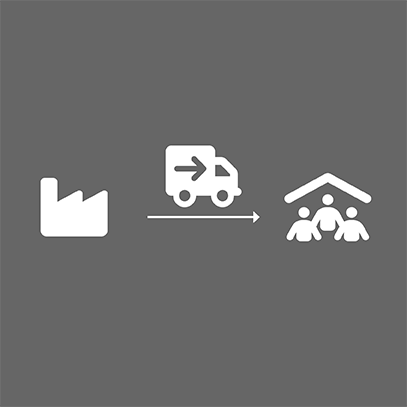Due diligence in our supply chain

All core suppliers are committed in writing via a Quality Agreement to comply with the United Nations and OECD Guiding Principles and our Social Standard. This sets out the basics of cooperation, such as human rights, labour practices, health and safety, environmental management, quality management, operations, homeworking and subcontracting, anti-corruption, bribery and the granting of benefits, as well as minerals from conflict and high-risk countries.
Compliance with the commitments is ensured by auditing suppliers in collaboration with the external company or our own trained staff. In the past financial year, 28 external audits of suppliers were conducted.
For implementation, we have integrated risk management into supplier assessment, whereby all suppliers and service providers are assessed according to country risk, supplier relationships and the results of audits. This risk and supplier assessment is updated annually or adjusted during the year in the event of anomalies. For the categorisation of the country risk, we use the "CSR Risk Check" (Home | CSR Risk Check (mvorisicochecker.nl)) as an external source. Suppliers are informed once a year about the results of the assessment carried out.
As an additional monitoring tool, we have set up two reporting channels for information on violations or anomalies.
To support our suppliers, an e-learning on the contents of the Supply Chain Sourcing Obligations Act as well as our Social Standards and Code of Conducts was created and sent to 323 suppliers and more than 3,000 employees in the past business year. We received feedback from 94 suppliers.
No violations of a human rights or environmental obligation were identified in the reporting period.
Complaint procedure

Employees, suppliers, agents and subcontractors may report violations of the uvex group's Social Standard to compliance@uvex.de. These reports can be made confidentially and the identity of the reporter is not disclosed.
Business partners must ensure that subcontractors, suppliers and their own business partners are also informed about this reporting procedure and made aware of its confidential nature.
In addition to the contact option mentioned above, an external ombudsman service has also been established. This can be reached as follows:
Ombudsman service:
Baker Tilly Rechtsanwaltsgesellschaft mbH
Nymphenburger Str. 3b
80335 München
Deutschland
Telefon: +49 89 55066-525
E-Mail: ombudsservice.uvex@bakertilly.de
uvex and the EU Chemicals Regulation REACH

The chemicals regulation REACH (Registration, Evaluation, Authorisation and Restriction of Chemicals; Regulation (EC) No. 1907/2006) has governed chemicals legislation within the EU since 1 June 2007. It goes without saying that we fully comply with the obligations arising from the overarching objectives and implementation of REACH regulations. After all, protecting people – and the environment too – is a definitive priority for us in connection with the use hazardous chemical substances. And it has been this way for many years. Since as far back as 2007, the uvex group has been developing an internal Restricted Substances List (RSL), for which the requirements are even stronger than the statutory requirements linked to the REACH regulation. This RSL is regularly updated in order to rapidly react to the latest scientific findings. The use of hazardous substances is therefore fundamentally prohibited in uvex products. When, in exceptional circumstances, the use of such substances is unavoidable, incredibly stringent conditions apply in order to avoid any risk to either the user(s) or the environment at all times.
Our suppliers must therefore confirm that they ensure compliance not only with the REACH regulation, but also with the internal uvex RSL too. In addition, compliance with all threshold values specified there is verified by independent laboratories on a regular basis. The test samples are obtained directly from our suppliers on site as well as from our own warehouses. We receive more than 600 test reports per year, which equates to tens of thousands of individual test results (as at 2019).